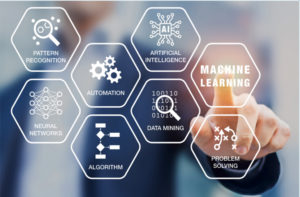With healthtech AI investment booming, companies are seeking guidance on when and how to protect that work.
Andrew (A.J.) Tibbetts, Greenberg Traurig

(Image courtesy of the FDA)
Can you get intellectual property (IP) for artificial intelligence (AI)? Absolutely. Should you file a patent application? Maybe, but there are alternatives. Should you consider data options? Yes. Is there a standard strategy for AI? Not if you want to see value from your IP.
The healthtech industry is investing heavily in software engineering and data science as it increasingly develops decision support, medical telemetry, surgical navigation and countless other medical software applications. The software investments naturally raise questions on how best to protect against copycats. It is certainly wise to obtain IP for your AI and software, to protect market position or set partnership terms. But while protecting other technologies may be relatively straightforward, protecting AI work can be complex. For companies that leverage IP to advance business interests — rather than getting patents as trophies — a detailed discussion with counsel of the ideas, the competitive market, the business goals and product design is key to obtaining defensible and valued protection for AI.
When establishing IP strategy for a healthtech company or product, it’s important to consider AI and software alongside other technologies and products. The work is protectable: Despite recent uncertainty about patentability of software, in both Europe and the U.S., leading data processing cases held healthtech software (e.g., cardiac signal processing) to be patent-eligible.
In addition, the IP is valuable. In summer 2022, after prevailing on validity and infringement of its AI-related patents at trial, a healthtech company asked the U.S. International Trade Commission to block import of Apple Watches. Multiple examples of successful trade secret enforcements for medical data and software exist. Nowhere is the phrase “data is the new currency” truer than with high-quality, anonymized data sets that healthtech companies gather and leverage in product design. Particularly when a product’s hardware matches a prior release or is largely conventional, or runs on someone else’s hardware, obtaining IP for the AI, software and data can be crucial for your company.
Against this backdrop of high value and concrete protection, though, companies face challenges. Some AI systems risk labeling as unpatentable mere automations of pre-existing manual processes. Given that many AI techniques leveraged today (including “deep” learning) are decades old, there may be related prior work. For back-end functionality, detecting infringement can be tricky. And in some cases, specific AI techniques are short-lived and soon replaced by improved versions.
These hurdles should not discourage you from protecting AI, but instead serve as helpful guides toward value and away from waste. IP counsel with deep familiarity here will analyze these factors together with product details and the business’ objectives. They will build a tailored IP strategy, which may lead away from patents and toward other IP, or trigger in-depth discussions of aligning a patent with value or supplementing with other IP.
Often, the focus may not be on the AI itself. Companies’ first thoughts are often of a specific model they trained, but the exact model may be relatively short-lived. There will be retraining and structural improvements. While your team’s chosen model performs well, alternatives may be available, and detecting whether a competitor is using your model or another may be difficult. For certain high-value models, trade secrets may be appropriate, but the IP conversation may focus more on other aspects of the product workflow that interact with the AI.
AI outputs typically drive downstream processing, leading to diagnostic output, control system change, a recommendation to a user, etc. That workflow is fruitful ground for AI IP. Though models evolve, AI-driven workflows may persist across product iterations. They may be more visible to customers and drive sales, and it may be possible to detect usage by competitors — both of which can drive patent value. Data rights and licensing for those AI outputs also present high value, particularly in context with corresponding inputs. The input processes may be ripe for IP, such as data curation and pre-processing of raw data into informative features. These input-output contexts may provide important support for patent protection. While diagnostic methods can be difficult to protect, improved analyses that rely on different features or generate different outputs are patentable. It also may be possible to consider trade secret protection where features or processing are not visible. Data rights for access to the input data can be priceless, particularly for training data obtained from partners. Such non-patent IP may be important where the AI is exactly mimicking a pre-existing manual process.
Despite the growth and importance of AI and software in healthtech, there is still uncertainty about protecting investments. Given the technical and legal complexities, defensible and valuable IP protection rests on experienced counsel tailoring the IP strategy through a deep understanding of the product and business.

Andrew (A.J.) Tibbetts, shareholder at Greenberg Traurig
Andrew (A.J.) Tibbetts is a shareholder in the Intellectual Property & Technology practice group in Greenberg Traurig’s Boston office. Formerly a software engineer, Tibbetts works with organizations large and small, serves on the board of MassMEDIC and guides digital health efforts for MassBio.
The opinions expressed in this post are the author’s only and do not necessarily reflect those of MedicalDesignandOutsourcing.com or its employees.